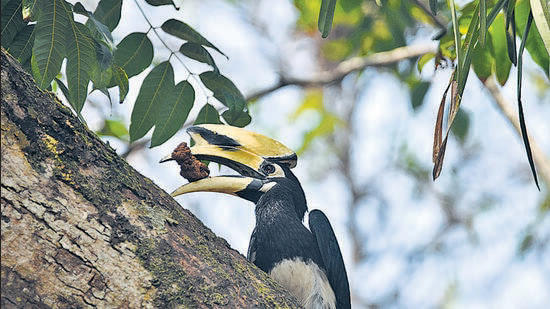The Delhi Zoological Park, nestled amidst the bustling urban landscape of the national capital, is poised to embrace a touch of wilderness from the lush green forests of Assam. In a significant stride towards biodiversity conservation and species enrichment, the zoo is gearing up to receive a prized addition to its avian family – the majestic hornbills. Hailing from the verdant landscapes of Assam, these iconic birds not only symbolize the rich natural heritage of the region but also embody the spirit of conservation and coexistence.
Hornbills, with their vibrant plumage and distinctive casques, are among the most charismatic inhabitants of the tropical forests of India’s northeast. Revered for their ecological significance and cultural symbolism, these avian marvels play a vital role in maintaining the delicate balance of their forest ecosystems. However, habitat loss, poaching, and illegal wildlife trade pose existential threats to their survival, underscoring the urgent need for concerted conservation efforts.
The collaboration between the Assam Forest Department and the Delhi Zoo marks a significant milestone in the realm of wildlife conservation. Through this partnership, efforts are underway to facilitate the translocation of hornbills from their natural habitat in Assam to the controlled environment of the zoo, where they will be provided with optimal care and protection. This translocation initiative not only serves as a testament to the commitment towards species conservation but also fosters greater awareness about the importance of preserving India’s rich biodiversity.
The selection of Delhi Zoo as the recipient of these hornbills underscores its reputation as a leading institution dedicated to wildlife conservation and education. With state-of-the-art facilities and expert personnel, the zoo is well-equipped to provide a conducive environment for the hornbills to thrive. Moreover, the presence of these magnificent birds is poised to enhance the zoo’s visitor experience, offering an opportunity for urban dwellers to connect with nature and learn about the importance of conserving our natural heritage.
The impending arrival of hornbills from Assam is not merely a translocation exercise but a reaffirmation of India’s commitment to wildlife conservation. As custodians of our natural heritage, it is incumbent upon us to safeguard the rich biodiversity that sustains life on Earth. By bringing these iconic birds under the protective umbrella of the zoo, we take a significant step towards securing their future and ensuring that future generations can marvel at their beauty and grace.
Furthermore, the translocation of hornbills to Delhi Zoo presents a unique opportunity for research and conservation initiatives. Scientists and researchers can study their behavior, breeding patterns, and dietary preferences in a controlled environment, thereby gaining valuable insights into their ecological requirements. Such knowledge is instrumental in formulating effective conservation strategies aimed at mitigating the threats faced by hornbills in their natural habitat.
Beyond their ecological significance, hornbills hold cultural significance for many indigenous communities across India’s northeast. Revered as symbols of prosperity and good fortune, these birds feature prominently in folklore, rituals, and traditional art forms. By showcasing hornbills in the heart of the national capital, Delhi Zoo not only celebrates India’s cultural diversity but also fosters a deeper appreciation for the intricate relationship between humans and wildlife.
However, the journey towards conservation is fraught with challenges, and the success of this endeavor hinges on collective efforts and sustained commitment. While the translocation of hornbills to Delhi Zoo marks a positive step forward, it is imperative to address the root causes of habitat degradation and wildlife exploitation. Public awareness campaigns, community engagement initiatives, and stringent law enforcement are essential components of a holistic approach towards biodiversity conservation.
As Delhi Zoo prepares to welcome its newest residents from Assam, it heralds a new chapter in India’s conservation narrative. The sight of hornbills soaring gracefully amidst the urban landscape serves as a poignant reminder of our interconnectedness with nature and the shared responsibility to protect our planet’s precious biodiversity. In their flight lies the promise of a harmonious coexistence between humans and wildlife, where every wingbeat resonates with the rhythms of conservation and stewardship.


